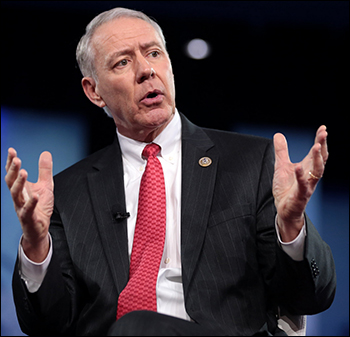Primaries
 Today, we conclude our early primary outlook with a recap of the May 14 primaries in Maryland, Nebraska, and West Virginia, and the May 21 contests in Georgia, Idaho, Kentucky, and Oregon.
Today, we conclude our early primary outlook with a recap of the May 14 primaries in Maryland, Nebraska, and West Virginia, and the May 21 contests in Georgia, Idaho, Kentucky, and Oregon.
Maryland
May 14 will host a very active day in Maryland politics. Voters will choose nominees for an open US Senate race and three open House seats which, in most cases, will determine who will also win the general election.
The big statewide race features US Rep. David Trone (D-Potomac) and Prince George’s County Executive Angela Alsobrooks vying for the open US Senate Democratic nomination to succeed retiring Sen. Ben Cardin (D). Cardin spent more than $24 million on his campaign before the end of 2023, but still has not fully pulled away from Alsobrooks in the polling. The winner will face former two-term Gov. Larry Hogan (R) in what is now a competitive general election even in this most Democratic of states.
Eleven-term Rep. Dutch Ruppersberger (D-Cockeysville) is retiring and leaves a six-way Democratic primary in his wake. The odds-on favorite to capture the party nomination and the seat in the general is Baltimore County Executive Johnny Olszewski (D), who already represents more people than the number who reside in a congressional district. State Delegate Harry Bhandari (D-Parkville) is one of the top contenders, but the race is Olszewski’s to lose.
With Rep. John Sarbanes (D-Baltimore) retiring, perhaps the largest congressional field in the country has assembled. A total of 22 Democrats have filed for the primary in a district where the party nominee will easily win the seat in November. Among the almost two dozen candidates are two state senators and three state delegates. With so many competing candidates, the party nomination is completely up for grabs.
Rep. Trone’s open 6th CD features crowded primaries for both parties in what should lead to a competitive general election. Democrats have fielded 14 candidates including April McClain Delaney, a former Commerce Department official who is married to former US Rep. John Delaney, and a pair of state delegates.
Republicans see seven contenders, two of whom have won major primaries but gone down to defeat in the general elections because they are too conservative for the region. Dan Cox, the 2022 GOP gubernatorial nominee and two-time congressional nominee and ex-state Delegate Neil Parrott, are the two most well-known Republicans competing for the nomination. Should one of them top the GOP field, the edge goes to the eventual Democratic nominee in a district that should be considered a toss-up.
Reps. Andy Harris (R-Cambridge), Glenn Ivey (D-Cheverly), Steny Hoyer (D-Mechanicsville), Kweisi Mfume (D-Baltimore) and Jamie Raskin (D-Takoma Park) all face minor primary opposition.
Nebraska
The Cornhusker State features both US Senate seats up for election in 2024. The second due to a previous resignation, but neither Sen. Deb Fischer (R) and appointed Sen. Pete Ricketts (R) face major competition in the Republican primary nor general election.
While Rep. Don Bacon (R-Papillion) will be embroiled in another tough general election battle in the Omaha anchored 2nd District, neither he nor state senator and 2022 congressional nominee Tony Vargas (D) have serious primary opposition.
Reps. Mike Flood (R-Norfolk) and Adrian Smith (R-Gering), whose district encompasses all or parts of 80 of Nebraska’s 93 counties in a seat that stretches from Wyoming to Iowa, face only minor primary opposition.
West Virginia
The Mountain State features open Senate and gubernatorial races; Republicans are favored in both contests. Sen. Joe Manchin’s (D) retirement makes the GOP eventual nominee, likely Gov. Jim Justice who is expected to defeat Rep. Alex Mooney (R-Charles Town), the prohibitive favorite. Wheeling Mayor Glenn Elliott is favored to win the Democratic primary.
The open Republican gubernatorial primary is a spirited contest featuring Attorney General Patrick Morrisey (R), who leads in all polls, and two sons of current West Virginia office holders. Former state Delegate Moore Capito and businessman Chris Miller, sons of US Sen. Shelley Moore Capito (R) and Rep. Carol Miller (R-Huntington), are battling for the nomination as is Secretary of State Mac Warner. The primary winner will become a strong favorite against the presumptive Democratic nominee, Huntington Mayor Steve Williams.
Rep. Mooney’s open 2nd District yields a Republican primary of five candidates, including state Treasurer Riley Moore, a nephew to Sen. Capito. Moore is a clear favorite to win the party nomination and defeat presumptive Democratic nominee Steven Wendelin in the general election.
Georgia
While the Peach State is arguably the most pivotal domain in the presidential election, 2024 is a rather quiet year for in-state Georgia politics. There is very little competition in the general election, but we do see three primaries of note.
In GOP Rep. Drew Ferguson’s open 3rd District, six Republicans compete for the party nomination including state Sen. Mike Dugan (R-Carrollton), two ex-legislators, and a former Trump White House aide. The two top finishers being forced into a June 18 runoff election is the likely primary outcome. In a district that 538 rates R+38, the eventual Republican nominee is a lock to win the general election.
Two Democratic members face primary opposition. Because of the latest court-ordered redistricting directive, Rep. Lucy McBath (D-Marietta) must run in a much different district than the current domain she represents. As a result, she is drawing primary opposition from state Rep. Mandisha Thomas (D-Atlanta) and Cobb County Commissioner Jerica Richardson. Rep. McBath is favored, but the two opponents forcing a runoff is not beyond the realm of possibility. The eventual Democratic nominee will have an easy run in November.
Veteran Rep. David Scott (D-Atlanta), no stranger to facing primary opposition, now has six Democratic opponents including Marcus Flowers, who challenged Rep. Marjorie Taylor Greene in 2022. East Point City Councilwoman Karen Rene is the only candidate within the group who has any current political constituency. Rep. Scott is again favored for renomination. GA-13 is safely Democratic in the general election.
Idaho
With no Senate or governor’s race on the ballot, the Idaho election cycle will be uneventful. In the primary, Rep. Russ Fulcher (R-Meridian) faces no primary opposition, while veteran Rep. Mike Simpson (R-Idaho Falls) drew two minor Republican challengers. No change is expected in the Gem State delegation.
Kentucky
The Blue Grass State is another place with little political activity this year. All incumbents are expected to easily retain their congressional seats.
Reps. Morgan McGarvey (D-Louisville), Thomas Massie (R-Garrison), and Hal Rogers (R-Somerset) each face minor opposition in their respective Democratic and Republican primaries.
Oregon
The Beaver State also has no governor or Senate race on the ballot this year, but there are three contested primaries scheduled for May 21.
Rep. Earl Blumenauer (D-Portland), retiring after serving what will be 28 years in the House at the end of the current term, leaves a safe Democratic seat (D+43) for which seven party members will compete. State Rep. Maxine Dexter (D-Portland), a physician, is one of the leading candidates. Former Multnomah County Commissioner Susheela Jayapal, sister to Washington US Rep. Pramila Jayapal (D-Seattle), and Gresham City Councilor Eddy Morales also appear to be viable contenders. The winner of this plurality primary will take the seat in November.
In the 5th District, Rep. Lori Chavez-DeRemer (R-Happy Valley) seeks a second term. She defeated Democrat Jamie McLeod-Skinner two years ago but may see a different opponent this year. While McLeod-Skinner is running again, the Democratic establishment, including the Democratic Congressional Campaign Committee (DCCC), is instead lining up behind state Rep. Janelle Bynum (D-Clackamas), which likely gives her the inside track toward the nomination. In a seat rated R+3, this will become a national congressional race in the general election.
The 6th District is the new seat that Oregon earned in the 2020 national reapportionment. Drawn as a D+7 district according to the FiveThirtyEight data organization, the first ever congressional race within the new domain finished in a closer manner. Then-state Rep. Andrea Salinas (D) captured the seat with a 50-48 percent victory margin over Republican businessman Mike Erickson.
While Rep. Salinas faces only minor primary competition, the Republican field is more crowded. Erickson returns but will face 2022 gubernatorial candidate David Burch and Dundee Mayor David Russ in the battle for the party nomination. In a presidential year with President Joe Biden expected to post a strong double-digit Oregon victory, Rep. Salinas has a much better chance of posting a wider margin in the ’24 congressional race.








